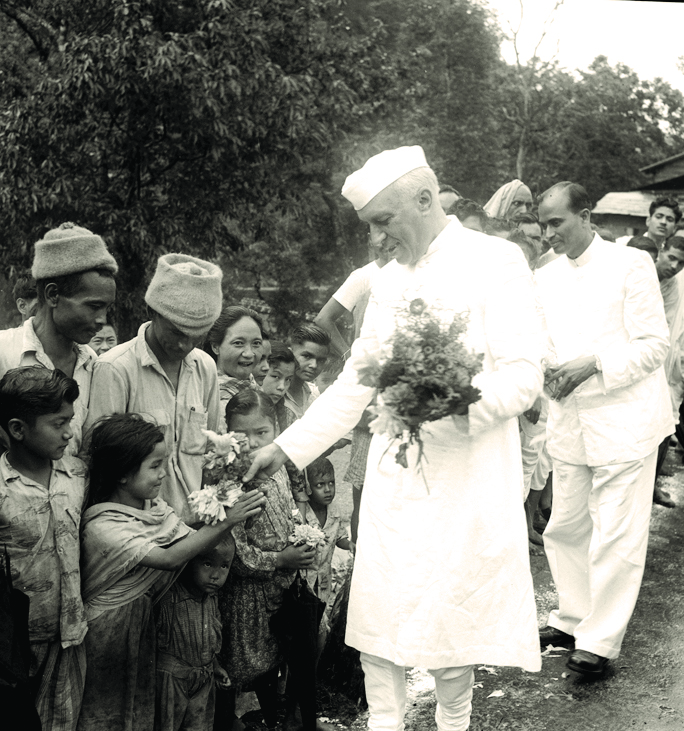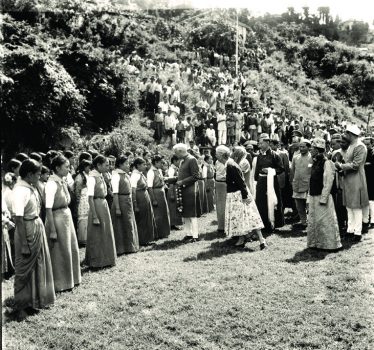Jawaharlal Nehru is better known for his role in the independence movement and as independent India’s first Prime Minister. However, his love for children – which is less known outside the country – is the reason why India celebrates November 14, his birth anniversary, as Children’s Day
“I like being with children and talking to them and, even more, playing with them. For the moment I forget that \I am terribly old and it is very long ago since I was a child.”
So said Jawaharlal Nehru, independent India’s first Prime Minister. He was writing an open letter to children, dated December 3, 1949, in a weekly magazine.
Nehru loved the innocence, the openness, the simplicity of children, and the fact that, unlike adults, they don’t build barriers of colour, caste, community, country and language, they accept people as they are.
Nehru’s special bond with children has gone down in Indian history as a soft, endearing facet of this Harvard-educated astute London bar-at-law, who turned steely fighter for independence and attained the stature of influential global leader. So, to commemorate this affinity, India celebrates Children’s Day on November 14, his birth anniversary, while Universal Children’s Day falls on November 20, the anniversary of both the United Nations Declaration of the Rights of the Child and the signing of the Convention on the Rights of the Child by the international community.
Mail Parenting
Multitasking perhaps came naturally to Nehru. In the tumultuous years of the Freedom Struggle, and the hectic years after India won independence from British rule, he, along with many others, put their personal lives on hold for the sake of shaping a nation out of a conglomeration of disparate, and often inimical fiefdoms, principalities, kingdoms, communities, and of course religious groups.
Yet, amidst all his preoccupations with coming to grips with a unique method of struggle – non-violent non-cooperation – and inspiring vast numbers of politically uneducated people to adopt it, while going in and out of prison with almost monotonous regularity, Nehru didn’t quite abdicate his responsibilities as a parent. His only daughter, Indira, whose middle name, Priyardarshini – ‘beloved to the eyes’ – is an indication of how much he doted on her, was growing up, and he could not be a hands-on father. But he didn’t let that stop him from communicating with her.
At one time, when he was busy with political activity in Ahmedabad, and little Indira was staying in Mussoorie with her grandparents, he sent her a series of letters giving her brief accounts of the story of the world, its nations and its people. “I hope [these] will make you think of the world as a whole and of other people in it as our brothers and sisters,” he wrote. They were subsequently published as Letters from a Father to a Daughter.
In a sense, building on these letters, he went on to write Glimpses of World History while he was in jail for participating in the Independence Movement.

“Prison life has its advantages; it brings both leisure and a measure of detachment,” wrote Nehru in his preface to Glimpses. This large body of letters, written with little or no access to reference material, delineates developments across the world that shaped history down the ages. Other books followed, all aimed at giving Indira a perspective of India and the world that went beyond mere textbooks. Not only she, but children in succeeding generations have had the windows of their minds opened by these letters.
“My father’s three books — Glimpses of World History, An Autobiography and The Discovery of India — have been my companions through life…. ,” writes the grown-up Indira (who too held office as Prime Minister), in her Foreword to Glimpses. “Indeed Glimpses was written for me. It remains the best introduction to the story of man for young and growing people in India and all over the world. The Autobiography has been acclaimed as not merely the quest of one individual for freedom, but as an insight into the making of the mind of new India. … Together, these books have moulded a whole generation of Indians and inspired persons from many
other countries.”
Long-term plans
Once India won independence, Nehru plunged into the tasks of nation building and also of laying the foundation of a new world force – the non-aligned countries. But despite other preoccupations, he kept sight of what he considered the real future of India – the children. He laid the foundation for children’s welfare, seeking support as Prime Minister from organisations such as the World Health Organization, and shaping policies to prevent malnutrition and infant mortality and boost child health. He took measures to set up institutions of higher learning, like the Indian Institutes of Technology (IITs) and the All India Institute of Medical Sciences (AIIMS). It was he who took the first steps to instituting the National Bravery Awards for Children.
His was the initiative behind the Children’s Film Society of India, which makes wholesome entertainment available to little ones.
The target group – children – were obviously too young to comprehend the importance and impact of these initiatives, but every child who came in contact with him responded to the genuine interest he took in them. To them, he was not Prime Minister Nehru. He was simply ‘Chacha’ Nehru – ‘Uncle’ Nehru. There are many anecdotes about Nehru’s bonding with children. At the core of all of them is the fact that he saw children as fledgling citizens of the country, irrespective of caste, creed, colour, community
or economic status.
——————————————————————————————————————————————————————————————————–
The special place children held in Nehru’s heart has been under-recorded, in comparison with the voluminous material available on his political and social achievements, not to mention his life as a private individual. Not all are appreciative of his efforts even in his efforts towards children, but there are some snippets in the public domain that offer telling insights into this facet of his personality.
Once, when Nehru was taking a walk in the grounds of Teen Murti Bhavan, which was his official residence, he heard a baby crying. Going in search of the source of the unexpected sound, he found an infant, only a couple of months old, wailing his heart out. He guessed that the child belonged to one of women working on the grounds. She must have left him asleep and gone back to her work. Unmindful of his exalted status, Nehru picked up the crying baby and soothed him in his arms. A short while later, the mother came running up, and was stunned to find her baby chuckling while the Prime Minister of the country tickled him!
An official of the International Cultural Forum remembers how he took a group of children to meet Prime Minister Nehru just before they left for a summer camp in the then Soviet Union. Nehru’s schedule was packed, and they had been given only a small window of time. But on meeting the children, Nehru got into the spirit of the occasion. He sat on the carpet with the youngsters, and showed them on an atlas where they were to go. He spoke to them about what life would be like there, while they enjoyed the snacks and soft drinks he ordered for them. The 15-minute appointment stretched to a full hour, and the whole group came out charged by the enthusiasm of the man they had just met.
